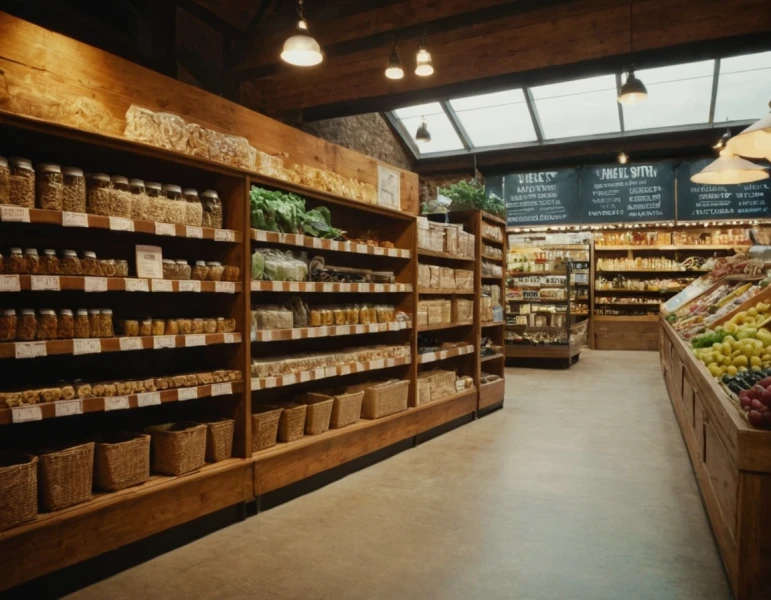Educa UNIVERSITY|SCIENCE AND ENGINEERING
Eco-Shops: A Personal and Necessary Journey through the World of Sustainability
Related Masters
Eco-Shops: A Personal and Necessary Journey through the World of Sustainability
I am Carlos Hidalgo, and if I have learned anything in life is that everything you consume has an impact. A few years ago, by chance (or by fate), I had my first contact with an organic store. What started as a simple curiosity ended up being a total change in my way of seeing the world and, above all, of understanding the importance of living sustainably.
Today I want to share my experience and show you that eco-friendly stores are not just a fashion whim, but a concrete solution to many of the problems we face as a society.
What is an ecological store?
To begin with, an ecological store is a space dedicated to the sale of products that respect the environment and seek to improve our health. Here you won't find single-use plastics, harsh chemicals or food that has been processed to the extreme. What you will find are products that - from production to consumption - have been produced in an environmentally responsible way.

But beware: it is not enough to label something as "eco-friendly" for it to be truly ecological. A store that deserves this title meets certain principles:
Sells products with organic and sustainable certifications.
Encourages the use of recyclable or biodegradable packaging.
Supports local producers and small farmers.
Offers bulk options to reduce waste.
In short, these stores are temples of sustainability that go far beyond a simple commercial transaction.
My first experience in an eco-friendly store
I remember my first visit like it was yesterday. I went in because I needed an "original" gift for a friend, and I came out with a renewed philosophy of life. It all started with a chat with the sales clerk, who explained to me what it meant for a product to be certified organic.
-Carlos, every time you choose a product, you are voting for the kind of world you want to live in-he told me.
And how right he was! That day I bought an organic jam, packaged in a reusable jar.
The result? I was hooked on the idea that I could consume without destroying. Over time, I learned that an organic store doesn't just offer food; you also find cleaning products, cosmetics, clothing and even sustainable energy.
Star products in organic stores
What can you find in an organic store? Here's a summary of the products that changed my life:
1. Organic food
Most of us have eaten food full of pesticides and synthetic fertilizers. In an organic store, every fruit, vegetable or grain comes from chemical-free crops and with a deep respect for biodiversity.
For example:
Organic tomatoes that taste like real tomatoes.
Bread made with whole-grain flours and no additives.
Healthy snacks and no refined sugars.
2. Organic cleaning products
Confess it: have you ever wondered what's in that all-purpose cleaner you use every day? Well, it turns out that many contain substances that are toxic to both your health and the rivers and seas where they end up.
Green cleaning products use ingredients such as vinegar, baking soda and essential oils. They clean just as well if not better, and I assure you that you'll breathe easy when using them.
3. Natural cosmetics
This was an eye-opening discovery! From soaps to creams, organic cosmetics avoid parabens and other harmful chemicals. In addition, many brands guarantee that their products are cruelty-free, meaning free of animal testing.
4. Sustainable clothing
The textile industry is one of the most polluting in the world. Clothes in organic stores are made with organic cotton, natural dyes and processes that reduce water consumption.
Benefits of choosing an organic store
If you still have doubts about why you should give them a try, here are the main benefits:
Care for your health: By consuming products free of chemicals and GMOs, you reduce the risk of allergies, diseases and hormonal problems.
Protects the environment: Opting for organic products reduces water, air and soil pollution.
Supports the local economy: Many stores work with small farmers and producers.
They reduce waste: Thanks to bulk sales and the use of sustainable packaging.
It seems like a small thing, but every purchase counts.
Challenges of organic stores
Of course, not everything is perfect. Buying organic also has its challenges:
Price: Products are often more expensive because of the sustainable processes they require.
Misinformation: Not everything that claims to be "natural" or "eco-friendly" really is. Learn to read labels and look for certifications.
Availability: In some small towns it's still hard to find eco-friendly stores. But don't worry, you can always turn to online stores.
Tips to start consuming sustainably
If you want to make the switch to a greener lifestyle, start small:
Bring your own bags and containers.
Focus on essential products: Start with food or cleaning products.
Support local producers.
Research and compare prices.Sometimes, consuming sustainable doesn't have to be more expensive.
Conclusion: An organic store is much more than a store
For me, organic stores are a statement of intent. It's choosing a more conscious and responsible lifestyle. Yes, it may be a little more expensive, but how do you put a price on a livable planet and a healthier life?
If you ever come across an organic store, I invite you to come in. Perhaps, as happened to me, you will leave not only with a product under your arm, but with a new way of looking at the world.
Faculties
Trainings
The faculties embrace diverse academic disciplines and fields of study, opening doors to new perspectives and exploring different spheres of wisdom in a constantly evolving world.














